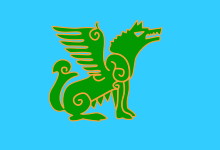Nogai Khan
| Nogai Khan | |
|---|---|

The flag of Nogai Khan.
|
|
| Spouse |
Euphrosyne Palaiologina Alagh (Алаг) |
| Issue | Djögä Tügä Toraï Chaka of Bulgaria |
| House | Borjigin |
| Father | Tatar |
| Religion | Islam |
Nokhai (died 1299), also called Nohai, Kara Nokhai, Isa Nogai, was a general and de facto ruler of the Golden Horde and a great-great-grandson of Genghis Khan. His grandfather was Baul/Teval Khan, the 7th son of Jochi. His name is also spelled Nohai and Nogaj. Nogai Khan was also a notable convert to Islam.
Pelliot wrote that Nokhai meant a "dog." Although in the Mongolian language, "nokhoi" (in Mongolian script: ᠨᠣᠬᠠᠢ, nokhai) literally means a "dog", it does not necessarily mean a particularly negative and insulting name in its context, since people were called "dogs" among the Mongols at the time and sometimes presently as "nokhduud" as in "you dogs (guys/men/people)." Genghis Khan also called his capable generals "dogs of war" or "men of war." This probably came about because Mongols had a lot of dogs, and dogs were very useful for people's lives in hunting and warnings. According to the historian J. J. Saunders, the name "Dog" was used to distract the attention of evil spirits (presumably, they would not be interested in a canine). The Mongols sometimes referred to the wolf as a "steppe dog".
Nogai was born to Tatar (Tutar), a son of Terval who was a son of Jochi. He would rule his grandfather's appanage after his father died. After the Mongol invasion of Europe, Batu Khan left Nogai with a tumen (10,000 warriors) in modern-day Moldavia and Romania as a frontier guard. He was a nephew of Berke Khan as well as Batu Khan and Orda Khan, and under his uncle, he became a powerful and ambitious warlord.
...
Wikipedia
